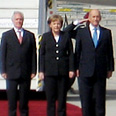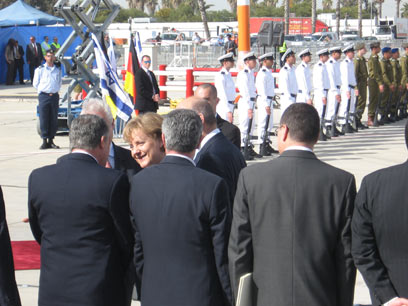
German chancellor arrives in Israel
Angela Merkel's three-day visit to Jewish state to be highlighted by historic address to Knesset. 'We will discuss Germany's historical responsibility,' she says
German Chancellor Angela Merkel on Sunday kicked off a three-day visit to Israel, acknowledging Germany's "historical responsibility" to the Jewish state and stressing her country's commitment to help resolve the Mideast conflict.
Merkel touched down at midafternoon at Ben-Gurion International Airport, where she was greeted by Prime Minister Ehud Olmert, an honor guard and many of the country's political and religious leaders. The visit is being highlighted by a historic address to the Israeli parliament, where she is expected to underline Germany's deep commitment to defending Israel and its right to exist.
Tuesday's speech has angered some lawmakers because of the painful memories of the Holocaust. Israel gained independence 60 years ago in the wake of the Nazi genocide of 6 million Jews. Some 250,000 Holocaust survivors live in Israel.
At the welcoming ceremony, Olmert expressed appreciation for Merkel's "extraordinary friendship, your deep understanding of Israel's security needs and the unwavering commitment you and Germany have shown to Israel's security." He also praised her "inspirational courage" in the battle against terrorism and Iran's nuclear ambitions.
Merkel said that during her visit, "We will discuss Germany's historical responsibility" as well as future projects "to make the world a better place," according to a translation of her remarks. She also expressed commitment to help to resolve the 60-year-old conflict between Israel and the Palestinians.

Merkel at Ben-Gurion Airport (Photo: Tal Rabinovky)
Merkel arrives at a time of heightened tensions between Israel and the Palestinians, whose efforts to make peace by the end of the year have been compromised by resurgent violence and Israeli construction on lands the Palestinians claim for a future state.
Peace efforts are expected to figure high on her agenda, though the chancellor will not be meeting with Palestinian leaders during her visit.
German Embassy spokesman Albert Graf said Merkel's visit was exclusively to Israel because it was designed to mark the 60th anniversary of Israel's creation and the inauguration of a new forum of meetings between members of the two countries' Cabinets.
Palestinian Foreign Minister Riad Malki said Merkel would soon pay a "special visit" to the West Bank to discuss German support for the Palestinians. Germany is a major donor to the Palestinian Authority, headed by moderate Palestinian President Mahmoud Abbas.
One of Israel's staunchest allies in Europe
Merkel was being accompanied by seven members of her cabinet and a delegation of German businesspeople to underscore the strength of the countries' relations. She is to meet with Olmert, President Shimon Peres and Foreign Minister Tzipi Livni during her trip. She also is scheduled to visit Israel's national Holocaust memorial.
Germany is one of Israel's staunchest allies in Europe and is heavily involved in efforts to prevent Iran from developing nuclear weapons, a pressing concern for Israel.
Merkel has stressed Germany's commitment to the security of the Jewish state in the face of Iranian President Mahmoud Ahmadinejad's repeated calls to wipe Israel off the map and denial of the Holocaust.
Germany is also a main contributor to the international force deployed in south Lebanon after Israel's 2006 war with Hizbullah guerrillas.
On Tuesday, Merkel is to address the Israeli parliament. The privilege is usually reserved for heads of state, rather than heads of government, but a special dispensation was made in Merkel's case because of her status among global leaders and what was described as her great friendship for Israel.
Merkel will deliver her address in German, provoking threats from one lawmaker to storm out of the session. A Merkel spokesman said the chancellor understood the sensitivity on this matter, but asked as the German head of government, to speak in her mother tongue.
Merkel is not the first German dignitary to address Knesset in German. Then-President Johannes Rau broke that barrier in 2000, delivering an emotional appeal "for forgiveness for what Germans have done."










